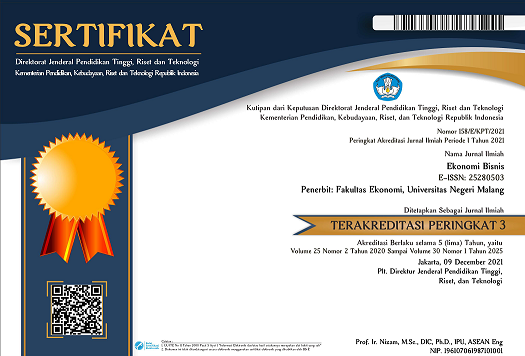IS ENVIRONMENTALLY-FRIENDLY PRODUCT PURCHASE INTENTION OF CRUELTY-FREE SKINCARE AFFECTED BY ENVIRONMENTAL RESPONSIBILITY?
Abstract
This study aims to determine the effect of environmental responsibility on environmentally-friendly product purchase intention with price sensitivity as a moderator. The research subjects are young generation who are interested to buy The Body Shop, Lacoco, and Avoskin skincare. The purposive sampling technique yielded 150 respondents for the research sample. This research is descriptive explanatory, and the method of collecting data is through the distribution of questionnaires to respondents. The analytical technique is an SEM of PLS assisted by SmartPLS 4.0. The study’s result found that there was a direct effect of environmental responsibility and environmentally-friendly purchase intention that positively affected young consumers of The Body Shop, Lacoco, and Avoskin. In addition, it is known that environmental responsibility has positively impact environmentally-friendly purchase intention. Also, the moderating role of price sensitivity for the relation of environmental responsibility and environmentally-friendly purchase intention has been accepted.
Full Text:
PDFReferences
Akdoğan, L., Durmaz, Y., (2023). The Effect of Environmental Responsibility on Green Consumption Intention: The Moderator Role of Price Sensitivity and the Mediator Role of Environmental Concern. A Case Study in Turkey. Environment, Development, and Sustainability. DOI: https://doi.org/10.1007/s10668-023-03083-6
Alaouir, T., Gustavsson, R., & Schmidt, N. (2019). Factors Driving Purchase Intention for Cruelty-free Cosmetics: A study of female millennials in Jönköping, Sweden. Jonkoping University, Independen(May),93. http://hj.divaportal.org/smash/get/diva2:1320983/FULLTEXT01.pdf%0Ahttp://urn.kb.se/resolve?urn=urn:nbn:se:hj:diva-44134
Ali, A., Xiaoling, G., Sherwani, M., & Ali, A. (2015). Will you purchase green products? The joint mediating impact of environmental concern and environmental responsibility on consumers’ attitude and purchase intention. Journal of Economics Management and Trade, 8(2), 80–93. https://doi.org/10. 9734/BJEMT/2015/17438
AMuri Yusuf. (2014). Metode Penelitian Kuantitatif, Kualitatif & Penelitian Gabungan Jakarta: Prenadamedia Group
Andorfer, V.A. and Liebe, U. (2015), “Do information, price, or morals influence ethical consumption? A natural field experiment and customer survey on the purchase of fair-trade coffee”, Social Science Research, 52 (4), pp. 330-350
Arafah, W. (2018). Marketing of Green Product in Indonesia Context Today. British Journal of Marketing Studies, 52-57.
Ayuningtyas, F., Mardani, P. B., & Putri, J. N. (2019). International Journal of Multicultural and Multireligious Understanding Creative Strategies to Drive Brand Awareness (Case of “Forever Against Animal Testing Campaign” The Body Shop Indonesia). International Journal of Multicultural and Multireligious Understanding, 6(4), 1–11.
Azalia, S. (2011). Vegan, Cruelty-free, Clean & Ethical Beauty: Mengapa Standar ini Penting?. Jakarta Vegan Guide. https://jakartaveganguide.com/post/beauty/vegan--cruelty-free--clean-and-ethical-beauty--mengapa-standar-ini-penting-/329
Biswas, A., & Roy, M. (2015). Leveraging factors for sustained green consumption behavior based on consumption value perceptions: Testing the structural model. Journal of Cleaner Production, 95, 332–340. https://doi.org10.1016/j.jclepro.2015.02.042
Chen, A., & Peng, N. (2012). Green hotel knowledge and tourists’ staying behavior. Annals of Tourism Research, 39(4), 2211–2216. https://doi.org/10.1016/j.annals.2012.07.003
Dimock, M. (2019). Defining generations: Where millennials end and generation z begins. Pew Research Center, 17
Djajadiwangsa, K. P., & Alversia, Y. (2022). Sustainable Beauty: Pengaruh Eco-Label, Product Attributes, Perceived Consumer Effectiveness (PCE), dan Environmental Awareness terhadap Green Purchase Behavior. INOBIS: Jurnal Inovasi Bisnis dan Manajemen Indonesia, 06 (02).
Duong, D. C., Doan, H. X., Vu, M.D., Ha, T.N., Dam, K.V. (2022). The Role of Perceived Environmental Responsibility and Environmental Concern on Shaping Green Purchase Intention. DOI: DOI: 10.1177/09722629221092117
Rizkia, Intan. 2014. Pengaruh Green Marketing Terhadap Elememen Keputusan Pembelian The Body Shop di Botani Square Bogor. Departemen Agribisnis: Institut Pertanian Bogor, diakses pada https://adoc.pub/pengaruh-green-marketing- terhadap-elemen-keputusan-pembelian.html
Cadete, B. (2021). How cruelty-free logos influence Consumers’ Purchase Intention. The effects of Brand Image, Logo Awareness and Moral Obligation. http://hdl.handle.net/10400.14/34753
Chan, R. Y. K. (2001). Determinants of Chinese consumers’ green purchase behavior. Psychol. Mark. 18, 389–413. doi: 10.1002/mar.1013
Chen, A., & Peng, N. (2012). Green hotel knowledge and tourists’ staying behavior. Annals of Tourism Research, 39(4), 2211–2216. https://doi.org/10.1016/j.annals.2012.07.003
Dwivedi, A. (2014). Self-Brand Connection With Service Brands: Examining Relationships With Performance Satisfaction, Perceived Value, and Brand Relationship Quality, Services Marketing Quarterly, 35 (1), 37-53, DOI: 10.1080/15332969.2014.856738
Febrianti, R. A. M. (2021). The Role of Marketing Communication and Innovation on Consumer Purchase Intention (Case Study at Restaurant X in Bandung City). 11(3), 1376–1385. https://doi.org/10.48047/rigeo.11.3.129
Ferdinand, Augusty. (2014). Metode Penelitian Manajemen, Semarang: Badan Penerbit Universitas Diponegoro
FIMELA. 2016. “Cruelty-free: Berhenti Siksa Hewan Demi Uji Produk Kecantikan.”. https://www.fimela.com/beauty/read/3761763/cruelty-free-berhenti-siksa-hewan-demi-uji-produk-kecantikan
Forever Againts Animal Testing. (2020). THE BODY SHOP. https://www.thebodyshop.co.id/stories/forever-against-animal-testing
Gallenti, G., Troiano, S., Cosmina, M., & Marangon, F. (2016). Ethical and sustainable consumption in the Italian coffee market: A choice experiment to analyse consumers willingness to pay. Italia Review of Agricultural Economics, 71(2), 153–176.
Goldsmith, R. E., & Newell, S. J. (1997). Innovativeness and price sensitivity: Managerial, theoretical and methodological issues. Journal of Product & Brand Management, 6(3), 163–174. https://doi.org/10. 1108/10610429710175682
Humane Society International. (2023). Be Cruelty-free Campaign. https://www.hsi.org/issues/be-cruelty-free/
Hartono, G. M., Salendu, A., & Gatari, E. (2020). Understanding Indonesian consumer’s intention to purchase organic food products: The moderating role of price sensitivity. Jurnal Psikologi Talenta, 6(1), 10–19. https://doi.org/10.26858/talenta.v6i1.13949
Hwang, C. G., Lee, Y. A., & Diddi, S. (2015). Generation Y’s moral obligation and purchase intentions for organic, fair-trade, and recycled apparel products. International Journal of Fashion Design, Technology and Education, 8(2), 97–107. https://doi.org/10.1080/17543266.2014.996917
Irwanto. 2006. Focus Group Discussion. Jakarta: Yayasan Obor Indonesia
Hsu, C. L., Chang, C. Y., & Yansritakul, C. (2017). Exploring purchase intention of green skincare products using the Theory of Planned Behavior: Testing the moderating effects of country of origin and price sensitivity. Journal of Retailing and Consumer Services, 34, 145–152
Jaiswal, J., & Bihari, S. (2020). Role of connectedness to nature and perceived environmental responsibility on green purchase behaviour. Asian Journal of Business Research, 10(3), 65–84. https://doi.org/10. 14707/ajbr.200091
Lasuin, C. A., and Ching, N. Y., Factors Influencing Green Purchase Intention among University Students. Malaysian Journal of Business and Economics 1(2), 1–14, 2014.
Malik, C.; Singhal, N.; Tiwari, S. Antecedents of consumer environmental attitude and intention to purchase green products: Moderating role of perceived product necessity. Int. J. Environ. Technol. Manag. 2017, 20, 259–279.
Groot, J.D., & Steg, L. (2009) Morality and Prosocial Behavior: The Role of Awareness, Responsibility, and Norms in the Norm Activation Model, The Journal of Social Psychology, 149(4), 425-449, DOI: 10.3200/SOCP.149.4.425-449
Jaiswal, J., Bihari, S., (2020). Role of Connectedness to Nature and Perceived Environmental Responsibility on Green Purchase Behaviour. Asian Journal of Business Research 10 (3), 2463-4522. DOI: 10.14707/ajbr.200091
Kumar, N., & Mohan, D. (2021). Sustainable apparel purchase intention: Collectivist cultural orientation and price sensitivity in extended TPB model. Journal of Revenue and Pricing Management, 20(2),149-161.
Kemenperin: Industri kosmetik tumbuh signifikan pada 2020 - ANTARA News. (2021). Antaranews.com. Retrieved April 28, 2023, from https://www.antaranews.com/berita/2003853/kemenperin-industri-kosmetik-tumbuh-signifikan-pada-2020
Liao, Y.K., Wu, W. Y., & Pham, T. T.,Examining the Moderating Effects of Green Marketing and Green Psychological Benefits on Customers’ Green Attitude, Value and Purchase Intention. Journal of Sustainability. doi:10.3390/su12187461
Lin, J., Lobo, A., Leckie, C. (2017). The role of benefits and transparency in shaping consumers’ green perceived value, self-brand connection and brand loyalty. Journal of Retailing and Consumer Services 35. 133–141.
Marwat, N. A., Ahmad, D. S., & Yousafzai, M. T. (2022). Examining the impact of environmental-beliefs on green purchase intentions via price sensitivity as moderator. City University Research Journal, 12(1).
Miles, M. B. A & Michael Huberman. (2014). Analisis Data Kualitatif. Penerjemah Tjetjep Rohendi Rohidi. Jakarta: UI Press
Moleong, L. J. (2012). Metodelogi Penelitian Kualitatif. Bandung: PT.Remaja Rosdakarya
Nasution. (2003). Metode Penelitian Naturalistik Kualitatif. Bandung: Tarsito
Ottman, J. A., Stafford, E. R., & Hartman, C. L. (2006). Avoiding green marketing myopia: ways to improve consumer appeal for environmentally preferable products. Environment 48, 22–36.
Paramitha, N. (2017). Apa Beda Label Cruelty Free dan No Animal Testing? Kalau Leaping Bunny dan Vegan? Yuk, Cari Tahu di Sini. Sociolla. https://doi.org/https://journal.sociolla.com/beauty/label-cruelty-free-no-animal- testing/
Rara, R. (2019). Penggunaan Hewan sebagai Bahan Uji Mulai Ditinggalkan Banyak Brand Kecantikan, Ini Alasannya. BeutyJournal.Id. https://journal.sociolla.com/beauty/penggunaan-hewan-sebagai-bahan-uji-mulai-ditinggalkan
Rehman, U.Z., Seman, A.A., & Harun, A. (2022). Examining the Moderating Effect of Price Sensitivity on the Relationship between Perceived Determinants and Intention to Purchase Green Products: Insights from Malaysian Consumers. A Conceptual Study. Proceedings of the 3rd Asia Pacific International Conference on Industrial Engineering and Operations Management.
Rizaty, M. A. (2021). Industri Kosmetik Tumbuh 5,59 Persen, Ini Merek Perawatan Tubuh Terlaris pada Agustus 2021. Databoks. https://doi.org/https://databoks.katadata.co.id/datapublish/2021/10/05/industri-kosmetik-tumbuh-559-persen-ini-merek-perawatan-tubuh-terlaris-pada-agustus-2021
Ruangkanjanases, A., You, J., Chien S., Chen., S., Chao, L. (2020). Elucidating the effect of antecedents on consumers’ green purchase intention: an extension of the theory of planned behaviuor. Front. Psych. doi: 10.3389/fpsyg.2020.01433
Saleki, R., Quoquab, F., & Mohammad, J. (2019). What drives Malaysian consumers’ organic food purchase intention? The role of moral norm, self-identity, environmental concern and price consciousness. Journal of Agribusiness in Developing and Emerging Economies, 9(5), 584–603. https://doi.org/10. 1108/JADEE-02-2019-0018
Saputri, M. A. G., & Pamungkas, I. N. A. (2021). Komunikasi Retorika Oleh Brand Ambassador Dalam Kampanye Kosmetik Cruelty-Free. Jurnal Ilmiah Komunikasi Makna, 9(1), 14. https://doi.org/10.30659/jikm.v9i1.11257
Sarasa, A. B. (2021). Permintaan Skincare Tembus 70%, Tren Kosmetik 2021 Bakal Tumbuh Pesat. SINDONEWS. https://daerah.sindonews.com/read/350478/701/permintaan-skincare-tembus-70- tren-kosmetik-2021-bakal-tumbuh-pesat-1614582187
Schuitema, G., & Groot, J. De. (2015). Green consumerism: The influence of product attributes and values on purchasing intentions. Journal of Consumer Behavior, 57–69. https://doi.org/10.1002/cb
Sheehan, K. B., & Lee, J. (2014). What’s cruel about cruelty free: An exploration of consumers, moral heuristics, and public policy. Journal of Animal Ethics, 4(2), 1–15. https://doi.org/10.5406/janimalethics.4.2.0001
Slavoljub, J., Zivkovic, L., Sladjana, A., Dragica, G., & Zorica, P. S. (2015). To the environmental responsibility among students through developing their environmental values. Procedia-Social and Behavioral Sciences, 171, 317–322. https://doi.org/10.1016/j.sbspro.2015.01.128
Sugiarto. (2017). Menyusun Proposal Penelitian Kualitatif Skripsi. Yogyakarta: Suaka Media
Sugiyono. (2017). Metode Penelitian Kuantitatif. Bandung: Alfabeta
Sugiyono. (2014). Metode Penelitian Kuantitaif Kualitatif dan R&D. Bandung: Alfabeta
Sugiyono. 2018. Metode Penelitian Kualitatif. Bandung: Alfabeta
Patnaik, A., Tripathy, S., & Dash, A. (2021). Identifying the features influencing sustainable products: A study on green cosmetics. In Advances in Mechanical Processing and Design: Select Proceedings of ICAMPD 2019, 631-640.
Proporsi Populasi Generasi Z dan Milenial Terbesar di Indonesia. (2021). Databoks. Retrieved April 28,katad 2023, from https://databoks.katadata.co.id/datapublish/2021/05/24/proporsi-populasi-generasi-z-dan-milenial-terbesar-di-indonesia
Purba, T. (2021). Faktor faktor yang mempengaruhi purchase intention pada Brand Man Man Tang di Batam. Scientia Journal: Jurnal Ilmiah Mahasiswa. http://ejournal.upbatam.ac.id/index.php/scientia_journal/article/view/2980
Walia, S. B., Kumar, H., & Negi, N. (2020). Impact of brand consciousness, perceived quality of products, price sensitivity and product availability on purchase intention towards ‘greenâ’ products. International Journal of Technology Management & Sustainable Development, 19(1), 107–118. https://doi.org/10.1386/tmsd_00018_1
Xinhua. (2019). China’s Generation Z outshines global peers in boosting consumption: Report. China Daily. www.chinadaily.com.cn/a/201901/30/WS5c516e21a3106c65c34e760f.html
Yen, G.F, Wang, R.Y, & Yang, H.T. (2017). How consumer mindsets in ethnic Chinese societies affect the intention to buy Fair Trade products: The mediating and moderating roles of moral identity. Asia Pacific Journal of Marketing and Logistics 29 (3), 553-568.https://doi.org/10.1108/APJML-06-2016-0107
Yang, L., & Ren, Y. (2020). Moral obligation, public leadership, and collective action for epidemic prevention and control: Evidence from the corona virus disease 2019 (COVID-19) emergency. International Journal of Environmental Research and Public Health, 17(8). https://doi.org/10.3390/ijerph17082731
Zhuang, W., Luo, X., & Riaz, M.U., (2021). On the Factors Influencing Green Purchase Intention: A Meta-Analysis Approach. Front. Pyschol. 12:644020. doi: 10.3389/fpsyg.2021.644020
Zinoubi, Z. G. (2020). Determinants of consumer purchase intention and behavior toward green product: Moderating role of price sensitivity. Archives of Business Research, 8(1), 261–273. https://doi.org/10. 14738/abr.81.7429
Zinoubi, Z. G. & Toukabri (2019). The antecedents of the consumer purchase intention: Sensitivity to price and involvement in organic product: Moderating role of product regional identity. Trends in Food Science & Technology. https://doi.org/10.1016/j.tifs.2019.02.028
DOI: http://dx.doi.org/10.17977/um042v28i2p8-21
Refbacks
- There are currently no refbacks.

This work is licensed under a Creative Commons Attribution-ShareAlike 4.0 International License.
Ekonomi Bisnis is licensed under a Creative Commons Attribution-ShareAlike 4.0 International License



